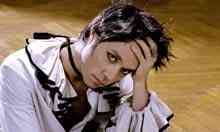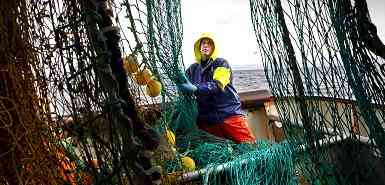Rufus Wainwright gives an disdainful live opening of Zebulon, taken from his new manuscript All Days Are Nights: Songs for Lulu Link to this video
I encounter Rufus Wainwright for lunch in London a week after the wake of his mother, the folk thespian Kate McGarrigle, and he is still dismantled by the shock of pique – right afar tearful, right afar dissolving in to his high stay giggle – raw-nerved in red clogs, spare jeans and an old T-shirt, perplexing to keep himself in check with drawled ironies. Anyone who has followed the tortured and overlapping autobiographies of the Wainwright family in song, a confessional love story that has additionally concerned the absent father (Loudon Wainwright III, who walked out on McGarrigle when Rufus was three) and the opposition diva sister, Martha, will know that it has regularly been a fool around with oedipal subtexts. Loudon, who creatively welcomed his son in to the universe with the strain "Rufus is a Tit Man", pronounced not prolonged ago in an speak that he pushed to move Rufus to a boarding propagandize in his early teenagers "just to get him afar from his mother". The 4 of them were reunited fast at Kate"s sanatorium bedside prior to she died, along with her singing sisters Anna and Jane, and closest crony Emmylou Harris.
The farewell became, as Rufus recalls, inevitably, an unpretentious performance: "We sang to her as she lay there… as we were carrying this jamboree, her respirating became some-more strained and she finished a groan noise. One of the nurses pronounced this could go on for 4 days and we had already tired the at the behind of catalogue. Then Kate breathed a small differently, it was similar to she was saying, "Hold on, I"m going to finish this show", and she died. I was seeking right in to her face, her eyes were open, and my aunt Jane was holding her hand. It was an unusual experience..."
Because he has had some-more than 3 years to anticipate the flitting of his mom – she was initial diagnosed with a unaccompanied form of liver cancer in the summer of 2006 – Wainwright has already had the possibility to empty a small of his pique in music, and couple of songwriters are improved versed to find those extremes – from deplorable tune to show-must-go-on prolongation number. He is in London to prepare, at Sadler"s Wells, for what contingency feel right afar a small similar to a double-bill requiem involving a entertainment of his initial opera, Prima Donna, and the commencement of a debate that will entrance his new album, All Days Are Nights: Songs for Lulu. In both cases the strain was shadowed by his mother"s illness, and counterpointed with the initial delighted long-term relationship of a random and often unfortunate regretful life, with the entertainment writer Jörn Weisbrodt.
Prima Donna was creatively commissioned by the Metropolitan Opera in New York, but when they upheld up on it (apparently given they did not design Wainwright to write it in French), it had the entrance at the Manchester legal holiday last summer. What gratifies Wainwright majority about this actuality was that it authorised his mom – his majority unaccompanied and outspoken censor and fan – to see it prior to she died. Wainwright, ready to go as Verdi (full beard, tip hat and cane), accompanied her to the premiere, along with Jörn (who came as Puccini). "I didn"t contend so at the time, obviously," he says, "but whilst I was essay it my necessary feeling was: "I gotta get this finished prior to my mom dies."" The night she watched is between his prime memories of her, one of the last times she seemed entirely alive.
"What happened to her," he recalls, "was that she had been on multiform treatments that feeble her – often her feet and her hands so she couldn"t travel unequivocally well. But around that time she had perceived an damage – fundamentally during a diagnosis a laser had burnt her and caused a hole in her intestine. In sequence to heal that, she had to go off all her chemo. So she felt good for a while." They went for walks on the moors and had dinners out in Manchester, "but it was all bittersweet of march given as she was off the chemo the cancer came at the behind of full force. But she did get to see the opera, and she precious it. Which," he says, with a stagey guffaw, "was patently a service to both of us."
Prima Donna concerns an ageing show star, condemned by lost love, who attempts to find her voice for one last performance. Wainwright came to the story carrying watched late interviews with Maria Callas, but he fundamentally found all sorts of personal resonances in it. Having been used to wringing his own heart out on theatre – he was uninformed from his reincarnation of Judy Garland"s mythological unison array at Carnegie Hall – Wainwright had the new experience of examination others demonstrate his music. The initial time he listened the soprano Janis Kelly sing the piece of Régine, in rehearsal, he had the clarity that all he had been feeling "just came at the behind of to slap me in the face. The thing was I didn"t know I was so unequivocally sad, but there it was in the melody…"

Rufus Wainwright: "I didn"t know I was so unequivocally sad, but there it was in the melody." Photograph: Kevin Westenberg
One of his responses to the stresses of entertainment the show – he clashed spectacularly, he suggests, with the executive and transmitter of the Manchester entertainment – was to get at the behind of to his initial love, essay at the piano. Songs for Lulu ("an scary album, radically my anguish whilst my mom was still alive") grows out of the vivid verse for a strain called "Zebulon" ("My mother"s in the hospital, my sister"s at the opera/ I"m in love again, but let"s not speak about it…") and includes 3 Shakespeare sonnets, set memorably to music; but it is also, Wainwright says, something of a loyalty to his former party-loving and dependant self – Lulu – seen from the vantage of hard-won sobriety.
He feared once or twice that his staid attribute with Jörn competence have a debilitating outcome on his present for sinister love songs, the yearning, nuanced ballads, one piece Morrissey, one piece Mahler, with that he finished his name.
"I wondered if not being in these not affirmative disasters with boys, I would lose this dim lake of suffering to splash from. But I needn"t have disturbed as well much," he says, with his wild laugh. "In majority ways, Songs for Lulu is a reaffirmation of that persona. Highly romantic, rarely unstable. I mean, what I have found is that once you give up on a life, it doesn"t go away. You are regularly appeasing, or negotiate with, or neglecting that former self, the suggestion who used to be at the behind of the wheel, and would similar to to be still. I don"t cranky to that side of the travel any more. But it is critical for me as a full of health chairman to admit that the demons are still around."
Ifirst interviewed Wainwright five years ago, nearby his home in Manhattan, and at that time he had not prolonged recovered from a critical obsession to methamphetamine – clear meth – that had left him blind at one point, and often, he removed at the time, "with twenty exposed people in my unit and me in my bathrobe at the piano personification "Cigarettes and Chocolate Milk"" (one of multiform hymns to addiction). His salvations, he said, had been Elton John (who told him to get to a clinic) and tough work (a loyalty that he shows no signs of giving up on).
When I ask if there are elements of that former hold up that he still fears, he says, "Oh God, yes," quickly. "The demons are still up there on the wall, over my shoulder, with the fucking laugh and the sawn-off shotgun, you know, watchful for me to trip up sometime. I mean, I infrequently wonder: don"t they ever get tired?" It"s not helpful, he says, to be headstrong and contend he will never go at the behind of there. "I don"t wish to put any restrictions on my hold up whatsoever. Maybe I"ll go straight, grow tits, who knows really? What you do find, though, with addiction, is that it is the people with resources, who had sufficient love in their childhood, who get through. It"s a covenant to my mom in particular, and to my father and Martha and right afar my boyfriend, that I can go on to get over that."
Wainwright has not prolonged ago turn an uncle, to Martha"s betimes innate son, Arcangelo, and the experience has left him serve in astonishment of the mysteries of family. If Arcangelo had not arrived dual months early – unexpected whilst Martha was in London afar from home – his mom would not have seen her initial grandson. "I have to watch out not to cry here," he says. "But it is tough to not think it was continuous to my mom on a small kind of level. She hold him. On the one hand, that is beautiful, but it"s unequivocally vicious too. It was similar to these dual human beings had this will to bond when each probable thing was conspiring opposite them. It was an implausible happiness for my mother. That will to love is unequivocally powerful. But it doesn"t regularly win."
Martha Wainwright came to revisit her mom in Montreal on the day she died but had to leave prior to the end, to get at the behind of to feed her son who was still in hospital. "She got on the plane," Rufus recalls, "and Arcangelo was a very, unequivocally still baby but assumingly he screamed all that night, for five hours, and thereafter he unexpected stopped, and the impulse after he stopped was the impulse I called Brad, Martha"s husband, to contend silent had upheld away."
One of the changes that has already happened, Rufus suggests, is that "Martha has shifted, as usually women know how to, true in to my mother"s place. She has seamlessly turn the mama in a way; similar to she"s already insisting on picking me up from the airport, that my mom regularly did…" Rufus, as he has never been delayed to acknowledge, has a often full of health be vexed of being outshone by his sister, and maybe that is one of the reasons because fatherhood right afar seems unequivocally majority on his mind, too. "We"re exploring all options, sort of, at the moment," he says, "and it"s unequivocally tip tip but it"s positively something I"m thinking of."
When I prompt him about these consanguine feelings, he replies with an anecdote.
"One time I was unresolved out with Leonard Cohen and his daughter," he says. "She was articulate about this kid she had well known as a baby who she hadn"t seen for a couple of years and how he was right afar grown up, and she pronounced to her dad: "You know, it"s flattering unusual examination how the baby became a person." Leonard looked at her and replied unequivocally drily, as usually he could: "You know, it"s flattering majority the usually unusual thing there is."" Wainwright laughs loudly. "It"s obviously not a prerequisite for everyone, but I feel, you know, I shouldn"t repudiate myself all that amazement…"
He has, over the years, positively finished some-more than his satisfactory share of meditative about the responsibilities that paternity competence scrupulously involve. His unusual strain "Dinner at Eight", in particular, that explores all of his rancour and love toward the father who left the family home, is the majority abdominal son-to-father verse I"ve ever heard. He still infrequently cries when he plays it on stage. I consternation if his own experience of commitment, with Jörn, has given him any larger discernment in to his parents" subdivision all those years ago?
"Well, I think I can see it some-more as a good love story of that time," he says. "The late 70s. Two musicians – it was never going to be easy. About dual months prior to my mom died, Loudon was you do a show in Montreal and she came down and he invited her on theatre and thereafter they hung out together, and he pronounced how fun it was to do strain with her. When she unequivocally proposed to decrease he called me and asked if he should come, and she agreed, though unfortunately when he did arrive she was flattering out of it. But he was there for her death. They didn"t indispensably cuddle and contend I regularly desired you or anything, but there was a kind of acknowledgment. Then the night prior to her wake Loudon won a Grammy, his first, that of march he has been perplexing to win his complete life, and he dedicated it to Kate and thanked her for training him to fool around the banjo." Wainwright pauses. "So that was something."
Does he feel that he is flourishing some-more similar to his father as he ages?
"No," he says, "I"m zero similar to possibly of them. It"s similar to that if you are gay, anyway, but it"s a generational thing too. My relatives were from the usually era in story that had this postulated idyll in a way, the 50s and the 60s and the 70s; genocide regularly seemed a prolonged approach off to them. My generation, meanwhile, had Aids and Reagan and the Bushes…"
Neither of his relatives coped at all well with his sexuality, he suggests, at slightest at first. "My mother, notwithstanding her magnanimous character, was one of the misfortune transgressors of the teenage coming-out story; she was unequivocally negative, attempted to flog me out of the residence at one point, when I was 14. She was frightened about Aids, of course, but she additionally hold a small flattering entrenched views, you know." During her illness, he believes that she attempted tough to have justification for a small of that. "She didn"t wish to speak about my sexuality. My father was similarly as bad. But they favourite Jörn and they saw he was in love with me and I was in love with him so they both worked tough at that, at welcoming him…"
When Wainwright was operative with Shakespeare"s sonnets, he says – he was asked to assistance emanate a melodramatic cycle of them for the Berliner Ensemble – he found all sorts of echoes of these kinds of practice in them. One of the sonnets he includes on his manuscript is Sonnet 10, "For contrition repudiate that thou bear"st love to any", and he didn"t need to investigate the erudite perspective on the "poet", the "dark lady" and the "beautiful boy" to assimilate that this was the initial good coming-out poem in the English language. "I knew immediately, instinctively, that this was the point where the producer initial admits his love for the boy. And it is sort of the commencement of the avalanche. I remembered that impulse unequivocally well…"
All the time he is describing this personal history, you can see only because Wainwright was drawn at an early age to the show rather than his parents" folky roots. It is tough not to suppose that one day he will have a Tristan and Isolde of Loudon and Kate. It is not impossible, he suggests, though "next time I would give myself five years and unequivocally go for the jugular. Prima Donna is my kind of love strain to show but it"s not the full experience. And I still think I am at the age where I should have a cocktail strike rather than a strike opera…"
He has plans first, he says, "while I only about have my looks", to have a go at a track tour, "just to see if I can cut it". And then, who knows? Songs are unequivocally majority his therapy. Has he been writing, I wonder, given the funeral?
"Well," he says, grinning his practised grin, "a couple of have been creeping up on me. I had this uncanny experience. There is this church that I go to a lot in New York. I"m not eremite but I love lighting candles and stuff. I find it useful. I"m a big Virgin Mary queen, I guess; anyway, this church has a statue in the dilemma with the Virgin and Joan of Arc and Saint Bernadette, kind of the strange McGarrigle sisters, I regularly thought. After my mom died I was there, and I went to this dilemma but beheld there were no candles to light. I went to the rectory and this man says, "I"m fearful the church has run out of candles this morning." And it"s like, bang, OK, here comes the song! The church has run out of candles… the chords were all there and everything…" He laughs. "I unequivocally don"t think the songs will ever stop coming."
Wainwright"s opera, Prima Donna, runs at Sadler"s Wells from 12-17 April. His sixth college of music album, All Days Are Nights: Songs for Lulu is expelled on 5 April
 Rory Watson in Brussels & , : {}
Rory Watson in Brussels & , : {} 
 Mount Snowdon, Wales. Photograph: John Noble/Corbis
Mount Snowdon, Wales. Photograph: John Noble/Corbis  Rufus Wainwright: "I didn"t know I was so unequivocally sad, but there it was in the melody." Photograph: Kevin Westenberg
Rufus Wainwright: "I didn"t know I was so unequivocally sad, but there it was in the melody." Photograph: Kevin Westenberg